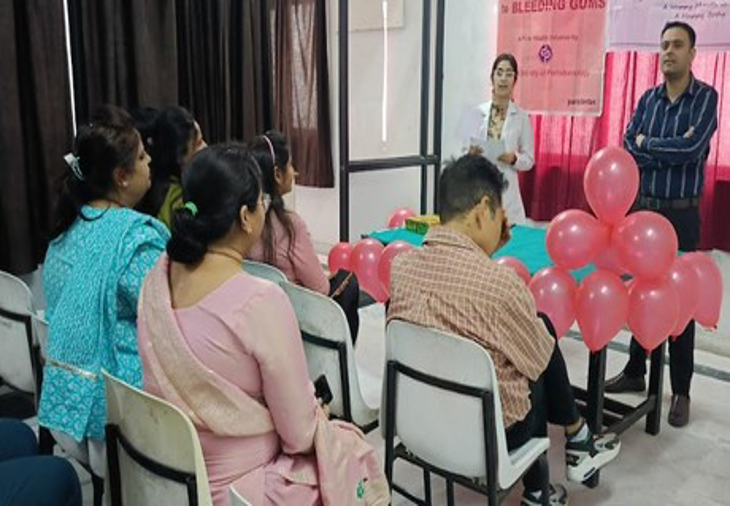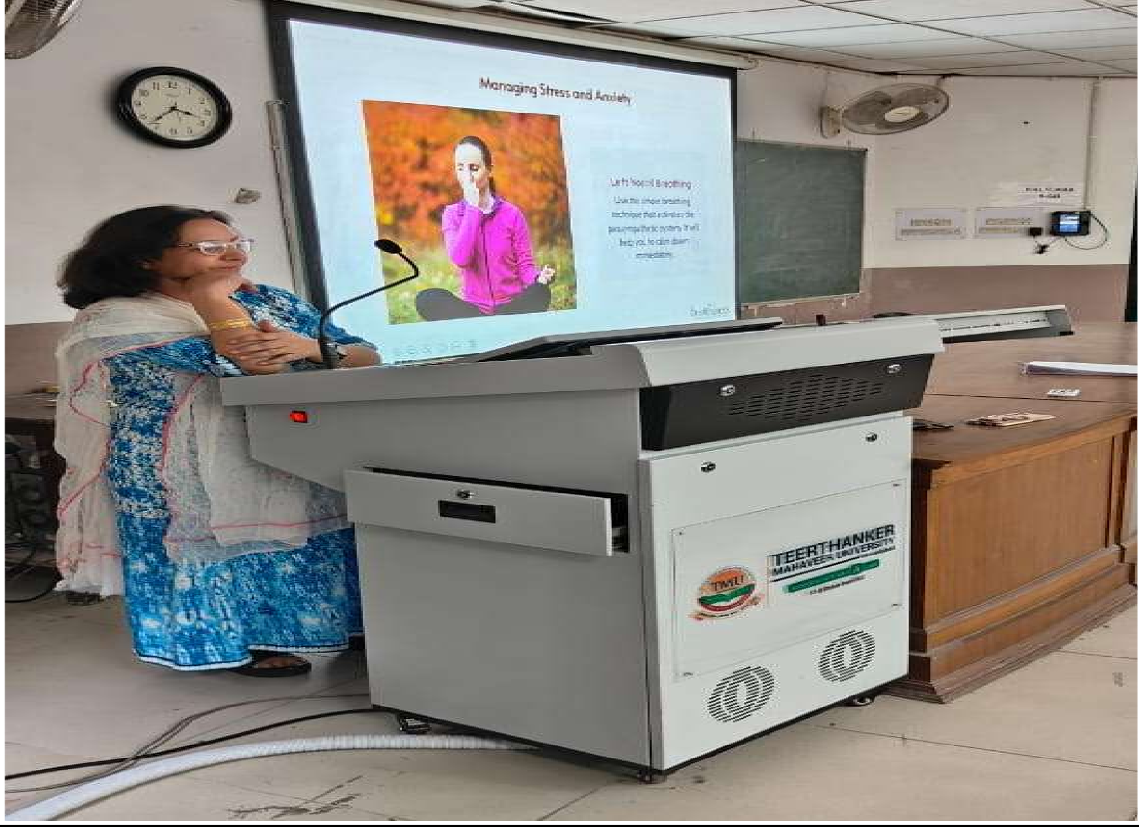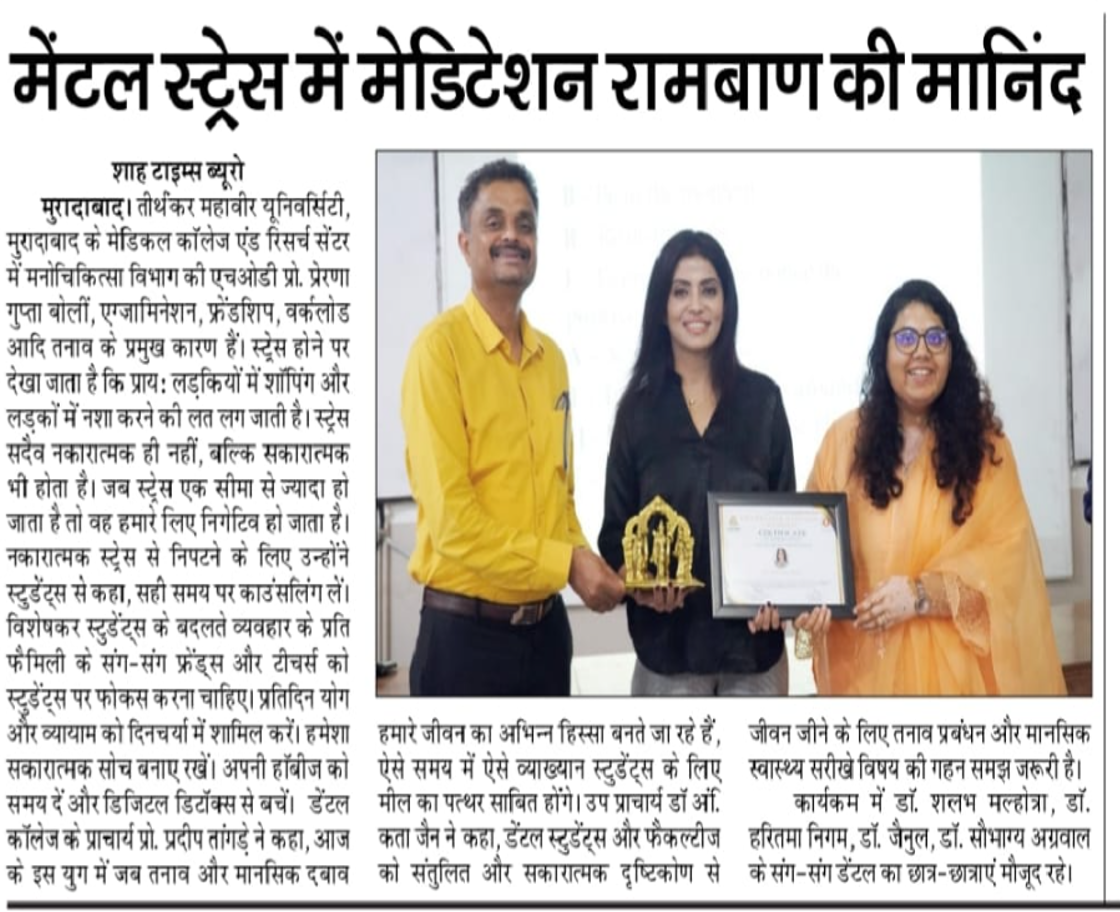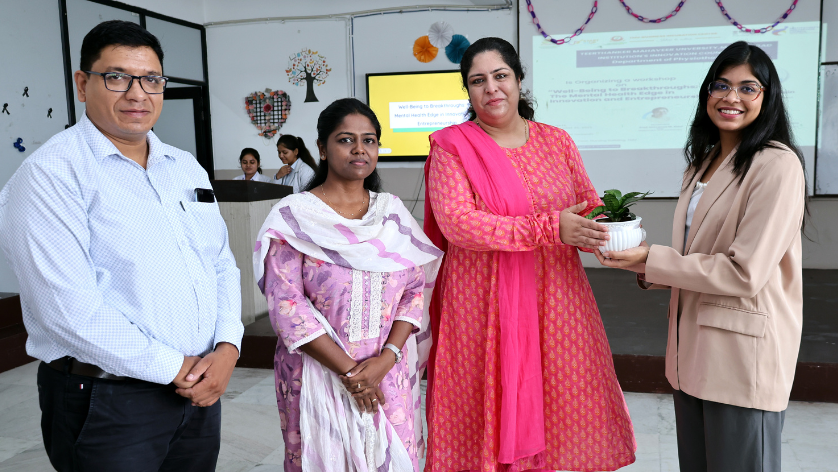
3.3.7 Mental Health Support For Staff
Teerthanker Mahaveer University (TMU) recognises that the well-being of its staff is essential for fostering a productive, compassionate, and high-performing academic environment. In alignment with SDG-3: Good Health and Well-Being, the University provides a structured mental health support system that ensures faculty and staff members have access to confidential and professional psychological care. TMU facilitates counselling services through qualified mental health experts who offer guidance on stress management, work–life balance, emotional resilience, and personal challenges.
The University conducts regular stress-relief workshops, mindfulness sessions, yoga programmes, and mental wellness seminars designed specifically for academic, administrative, and support staff. These sessions equip employees with coping strategies to manage workplace pressures, burnout, and occupational fatigue. TMU’s Human Resource Department also conducts sensitisation programmes that promote mental health literacy and reduce stigma surrounding emotional concerns.
Leadership at TMU encourages an open and supportive organisational culture where supervisors are trained to identify early signs of distress and direct staff to appropriate support services. Additionally, TMU Hospital ensures timely access to psychological and psychiatric care when required, thereby strengthening the overall safety net for employees.
By nurturing a workplace environment that values emotional well-being, teamwork, and psychological safety, TMU demonstrates its strong commitment to SDG-3.3.7, ensuring that staff members remain healthy, motivated, and able to excel in their professional roles.
Mental Health Support Initiatives
TMU recognizes that the well-being of its staff is crucial for maintaining a healthy and productive academic and clinical environment. The institution actively promotes mental health through regular workshops, awareness campaigns, faculty clubs, and stress management sessions creating a culture that prioritizes psychological well-being. Staff members have access to free counseling services, dedicated helplines, and guidance on external mental health resources, ensuring timely support for personal and professional challenges. These initiatives enhance staff resilience, reduce burnout, improve job satisfaction, and strengthen overall workplace morale, ultimately contributing to better academic outcomes and a more supportive environment for both students and the wider community.
Yoga, Relaxation & Mediations sessions
Yoga, relaxation, and meditation sessions were conducted at Teerthanker Mahaveer University (TMU).
These sessions focused on promoting holistic wellness and stress management among students and faculty.
Participants engaged in guided yoga stretches, breathing exercises, and meditation techniques.
A facilitator led the group through synchronized arm movements and stretching exercises, aiming to
improve flexibility and mental clarity.
The participants, including both students and faculty, were attentive and actively involved throughout
the sessions, demonstrating a collective commitment to well-being.< In addition to physical yoga,
participants practicing seated meditation with closed eyes, fostering relaxation, focus, and inner
calm. The environment appeared calm and supportive, helping participants to disconnect from external
distractions and cultivate mindfulness.
The sessions were accompanied by thematic presentations, such as “Building Resilience” and “Managing
Stress and Anxiety,” emphasizing practical ways to strengthen mental health and emotional
resilience. The facilitators, as shown in the images, provided insightful guidance, combining
hands-on practices with educational discussions on the importance of self-care and stress
management.
Overall, the yoga, relaxation, and meditation sessions at TMU received enthusiastic participation.
The blend of practical exercises and expert talks contributed to a nurturing environment that
encouraged both physical and mental rejuvenation, supporting the university community in adopting
healthier lifestyle practices.
Stress Management Committee and Measures
A Stress Management Committee was constituted on August 2, 2024, with the approval of Higher Competent
Authorities to manage stress among students (UG & PG) and staff.
The committee follows a flow-chart involving Professional Coordinators, HODs, Mentors, Guides, and
Co-guides for managing stress.
The committee members include:
| Name | Designation/Department | Role |
|---|---|---|
| Dr. Sadhna Singh | Professor, Community Medicine | Coordinator |
| Dr. Shivi Saxena | Ph.D. – Psychology | Psychologist |
| Dr. Jayballabh Kumar | Professor & Head, Physiology | UG Coordinator 1st Year |
| Dr. Shweta R. Sharma | Professor, Microbiology | Member Secretary |
| Dr. Sudhir Singh | Professor, Microbiology | Coordinator Mentor-Mentee |
| Dr. Shubhra Agarwal | Professor, OBG | Member |
| Dr. Manish Tyagi | Assistant Professor, Psychiatry | Member |
Measures for Stress Management:
- Physical Yoga: Stress Management Sessions, including physical yoga by Mr. Gaurav Tyagi (Coordinator of AYUSH Yoga under Ministry of Ayush), are held weekly (every Thursday) for Post-Graduate Students.
- Guided Heartfulness Relaxation and Meditation: Conducted by In-campus Heartfulness trainer of Relaxation & Meditation, Prof. (Dr.) Sadhna Singh of Community Medicine, TMMC&RC, Moradabad, under the MoU between Heartfulness Education Training (HET) and Teerthanker Mahaveer University (TMU).
- Stress Management CMEs: Stress management related CMEs for Doctors are held under Heartfulness institute on a regular basis, including subjects like Resilience in crises and Resolution of conflicts, followed by one stress-related topic fortnightly.
- 24x7 Stress Related Helpline: A helpline, “Voice That Cares”, was shared with all students (PG/UG).
- Referral System: Feedback about students with stress issues is immediately sent to the college counselor (Dr. Shivi Saxena, Ph.D. – Psychology), who refers them to the Psychiatry department for further support if needed, maintaining student confidentiality.
- Hostel Rounds: Regular Hostel rounds are done by the chief hostel warden and the wardens for timely intervention regarding any stress-related issues.
- Weekly Mentor – Mentee Meeting: Weekly mentor – mentee meetings are held for all students, who are instructed to contact any faculty/mentor for help and support.
- Weekly Recreational Activities: Weekly recreational activities, including sports, cultural events, and others, are conducted throughout the year.







